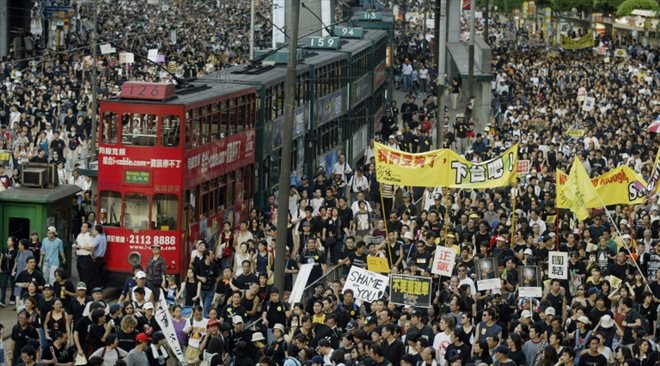Police officers accompanied by dogs stand guard outside the West Kowloon court in Hong Kong, December 22, 2023 (AFP/Archives/Peter PARKS)
The draft new national security law carried by the Hong Kong authorities is raising fears and questions within the territory’s business circles due to the legal vagueness surrounding its implementation.
The text, presented Friday to the city’s Legislative Council, provides for offenses such as treason and insurrection, punishable by life imprisonment.
The government has said it intends to pass the bill as soon as possible to fill legislative gaps left by the national security law imposed on Hong Kong by Beijing in 2020, after the year’s massive pro-democracy protests. previous in the territory.
Authorities say it is their constitutional responsibility to pass national security legislation in accordance with Hong Kong’s Basic Law, a mini-constitution that has governed the city since it was handed over to China by the United Kingdom in 1997.
But the territory is entering “unknown, unexplored waters” with the proposed law, reports Kristian Odebjer, president of the Swedish Chamber of Commerce in Hong Kong, to AFP.
The offenses include treason, insurrection, espionage and theft of state secrets, endangering national security and external interference.
The definitions are “vague”, observes Mr Odebjer, particularly with regard to the theft of state secrets, which includes defense intelligence but also information on the economic, social and technological developments of the city.

A police officer covers his ears to protect himself from a noisy demonstration in front of the Legislative Council building in Hong Kong, February 26, 2003 (AFP/Archives/Peter PARKS)
“This could have a negative impact on the activities in which some of our members engage, such as research and due diligence activities (consultation of accounts, Editor’s note),” according to Mr. Odebjer.
These activities “contribute, even are necessary, to the proper functioning of a financial center and a market economy like Hong Kong,” he stressed.
According to city leader John Lee, a former police officer sanctioned by the United States, the new text, known as Article 23 of the Basic Law, will act as “an effective lock to keep out burglars.”
It will complement the national security law imposed by Beijing, which covers four major crimes: secession, subversion, terrorism and collusion with foreign forces.
– “Red line” –
For an economist working for an international bank, the main problem “is that, more and more often, we don’t really know where the red line is.”
Banks, companies and investors regularly rely on research, economic data and due diligence reports that could be considered “state secrets”.

Hong Kong Chief Executive John Lee (c), Justice Secretary Paul Lam (l) and Security Secretary Chris Tang (d) hold a press conference in Hong Kong, January 30, 2024 (AFP/Archives/Peter PARKS)
The Hong Kong Bar Association recommended that the government ensure that “legitimate trade secrets… do not inadvertently fall within the scope” of the state secrets offence.
He also provided a fictional example of a company researching “booster fuels” for vehicles, and subsequently discovering they can be used for rockets and missiles.
Should the company “continue to hold these secrets, knowing that the illegal possession of state secrets is a crime?”, asked the bar.
– The “worst” of worlds –

Thousands of people block the streets and trams in a huge protest against a controversial anti-subversion law known as Article 23 in Hong Kong in 2003 (AFP/Archives/Peter PARKS)
In 2003, a previous attempt to introduce a national security law met with massive rejection.
Hundreds of thousands of Hong Kongers had protested what they saw as an erosion of the freedoms that Beijing had promised to maintain in Hong Kong for 50 years after the handover, under the “one country, two systems” doctrine.
Now, four years after the Beijing-imposed law was enacted, much of the opposition and pro-democracy activists have been arrested, silenced or fled abroad.
“In summary, they took the worst of the criminal law of mainland China, the worst of the anti-terrorism laws of the post-September 11 English-speaking countries and the worst of colonial law,” a diplomat told AFP. requested anonymity due to the sensitivity of the issue.
According to him, the decision of international companies to set up in Hong Kong was due to the “one country, two systems” doctrine, which allows the city to be governed by a legal system modeled on the British “common law” rather than by the opaque legal system of mainland China.
“Today, it seems that the border between the two systems is becoming more and more tenuous,” observes the diplomat.
© 2024 AFP
Did you like this article ? Share it with your friends using the buttons below.




